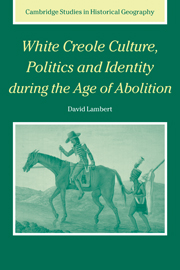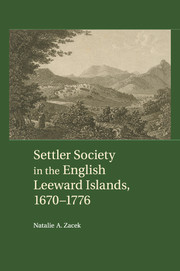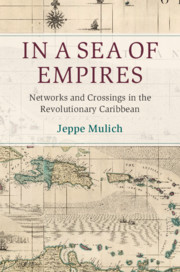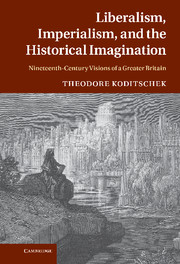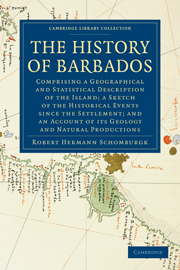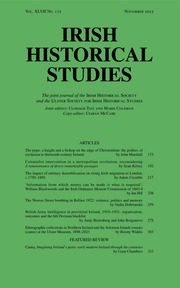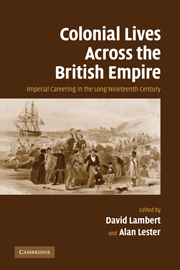White Creole Culture, Politics and Identity during the Age of Abolition
Part of Cambridge Studies in Historical Geography
- Author: David Lambert, Royal Holloway, University of London
- Date Published: December 2010
- availability: Available
- format: Paperback
- isbn: 9780521172394
Paperback
Other available formats:
Hardback
Looking for an inspection copy?
Please email [email protected] to enquire about an inspection copy of this book
-
David Lambert explores the political and cultural articulation of white creole identity in the British Caribbean colony of Barbados during the age of abolitionism (c.1780–1833), the period in which the British antislavery movement emerged, first to attack the slave trade and then the institution of chattel slavery itself. Supporters of slavery in Barbados and beyond responded with their own campaigning, resulting in a series of debates and moments of controversy, both localised and transatlantic in significance. They exposed tensions between Britain and its West Indian colonies, and raised questions about whether white slaveholders could be classed as fully 'British' and if slavery was compatible with 'English' conceptions of liberty and morality. David Lambert considers what it meant to be a white colonial subject in a place viewed as a vital and loyal part of the empire but subject to increasing metropolitan attack because of the existence of slavery.
Read more- A sustained exploration of the development and expression of white colonial identities in the West Indies
- Considers the cultural and political aspects of the campaign against slavery from the perspective of West Indian slaveholders
- Engages with the two themes of Whiteness Studies and Atlantic World Studies
Reviews & endorsements
Review of the hardback: 'White Creole Culture is an exemplary cultural history, with its in-depth exploration of individuals and moments, its interdisciplinary range, its utilisation of a range of texts from court cases and poetry to rebel flags and the colonial press, and its eloquent account of the conjunctural formation of white colonial identities across metropole and colony.' Journal of Historical Geography
See more reviewsReview of the hardback: 'Lambert is the first writer since Edward Braithwaite to examine in depth how whites in the Caribbean developed an embryonic white Creole … The major virtue of Lambert's sensitive delineations of white identities is that it will force historians to pay more attention to divisions within the master class and to how whiteness, and by implication blackness, were contested discourses with significant political implications.' English Historical Review
Review of the hardback: '… theoretically stimulating and empirically rich.' H-HistGeog
Customer reviews
Not yet reviewed
Be the first to review
Review was not posted due to profanity
×Product details
- Date Published: December 2010
- format: Paperback
- isbn: 9780521172394
- length: 258 pages
- dimensions: 229 x 152 x 15 mm
- weight: 0.38kg
- availability: Available
Table of Contents
List of illustrations
Acknowledgements
Introduction: white creole culture, politics and identity
1. The geographical 'problem of slavery'
2. Joshua Steele and the 'improvement' of slavery
3. Making a 'well constituted Society': the ambitions and limits of white unity
4. Locating blame for the 1816 Rebellion
5. Anti-Methodism and the uncertain place of Barbados
6. 'Days of misery and nights of fear': white ideas of freedom at the end of slavery
Epilogue
Bibliography
Index.
Sorry, this resource is locked
Please register or sign in to request access. If you are having problems accessing these resources please email [email protected]
Register Sign in» Proceed
You are now leaving the Cambridge University Press website. Your eBook purchase and download will be completed by our partner www.ebooks.com. Please see the permission section of the www.ebooks.com catalogue page for details of the print & copy limits on our eBooks.
Continue ×Are you sure you want to delete your account?
This cannot be undone.
Thank you for your feedback which will help us improve our service.
If you requested a response, we will make sure to get back to you shortly.
×
